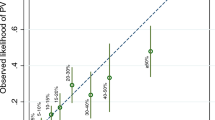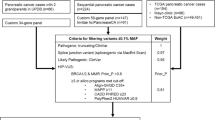Abstract
Introduction
Identifying families with an underlying inherited cancer predisposition is a major goal of cancer prevention efforts. Mendelian risk models have been developed to better predict the risk associated with a pathogenic variant of developing breast/ovarian cancer (with BRCAPRO) and the risk of developing pancreatic cancer (PANCPRO). Given that pathogenic variants involving BRCA2 and BRCA1 predispose to all three of these cancers, we developed a joint risk model to capture shared susceptibility.
Methods
We expanded the existing framework for PANCPRO and BRCAPRO to jointly model risk of pancreatic, breast, and ovarian cancer and validated this new model, BRCAPANCPRO on three data sets each reflecting the common target populations.
Results
BRCAPANCPRO outperformed the prior BRCAPRO and PANCPRO models and yielded good discrimination for differentiating BRCA1 and BRCA2 carriers from non-carriers (AUCs 0.79, 95% CI: 0.73–0.84 and 0.70, 95% CI: 0.60–0.80) in families seen in high-risk clinics and pancreatic cancer family registries, respectively. In addition, BRCAPANCPRO was reasonably well calibrated for predicting future risk of pancreatic cancer (observed-to-expected (O/E) ratio = 0.81 [0.69, 0.94]).
Discussion
The BRCAPANCPRO model provides improved risk assessment over our previous risk models, particularly for pedigrees with a co-occurrence of pancreatic cancer and breast and/or ovarian cancer.


Similar content being viewed by others
Data availability
Data are available, through a collaborative agreement, upon request. BRCAPANCPRO is part of the R package BayesMendel and freely available for research use.
References
Parmigiani G, Berry D, Aguilar O. Determining carrier probabilities for breast cancer-susceptibility genes BRCA1 and BRCA2. Am J Hum Genet. 1998;62:145–58.
Berry DA, Parmigiani G, Sanchez J, Schildkraut J, Winer E. Probability of carrying a mutation of breast-ovarian cancer gene BRCA1 based on family history. J Natl Cancer Inst. 1997;89:227–38.
Wang W, Chen S, Brune KA, Hruban RH, Parmigiani G, Klein AP. PancPRO: risk assessment for individuals with a family history of pancreatic cancer. J Clin Oncol. 2007;25:1417–22.
Chen S, Wang W, Lee S, Nafa K, Lee J, Romans K, et al. Prediction of germline mutations and cancer risk in the Lynch syndrome. JAMA. 2006;296:1479–87.
Klein AP, Beaty TH, Bailey-Wilson JE, Brune KA, Hruban RH, Petersen GM. Evidence for a major gene influencing risk of pancreatic cancer. Genet Epidemiol. 2002;23:133–49.
Parmigiani G, Chen S, Iversen ES Jr, Friebel TM, Finkelstein DM, Anton-Culver H, et al. Validity of models for predicting BRCA1 and BRCA2 mutations. Ann Intern Med. 2007;147:441–50.
Leonardi G, Marchi S, Falconi M, Zerbi A, Ussia V, de Bortoli N, et al. “PancPro” as a tool for selecting families eligible for pancreatic cancer screening: an Italian study of incident cases. Dig Liver Dis. 2012;44:585–8.
Kurian AW, Gong GD, John EM, Miron A, Felberg A, Phipps AI, et al. Performance of prediction models for BRCA mutation carriage in three racial/ethnic groups: findings from the Northern California Breast Cancer Family Registry. Cancer Epidemiol Biomark Prev. 2009;18:1084–91.
Chen S, Wang W, Broman KW, Katki HA, Parmigiani G. BayesMendel: and R environment for Mendelian risk prediction. Stat Appl Genet Mol Biol. 2004;3:Article21.
SEER. Surveillance, Epidemiology, and End Results (SEER) Program Populations (1969-2018), National Cancer Institute, DCCPS, Surveillance Research Program, released December 2019. Bethesda, MD: National Cancer Institute, DCCPS, Surveillance Research Program, Surveillance Systems Branch; 2019.
Hu C, Hart SN, Polley EC, Gnanaolivu R, Shimelis H, Lee KY, et al. Association between inherited germline mutations in cancer predisposition genes and risk of pancreatic cancer. JAMA. 2018;319:2401–9.
Mocci E, Milne RL, Mendez-Villamil EY, Hopper JL, John EM, Andrulis IL, et al. Risk of pancreatic cancer in breast cancer families from the breast cancer family registry. Cancer Epidemiol Biomark Prev. 2013;22:803–11.
Petersen GM, de Andrade M, Goggins M, Hruban RH, Bondy M, Korczak JF, et al. Pancreatic cancer genetic epidemiology consortium. Cancer Epidemiol Biomark Prev. 2006;15:704–10.
Zhen DB, Rabe KG, Gallinger S, Syngal S, Schwartz AG, Goggins MG, et al. BRCA1, BRCA2, PALB2, and CDKN2A mutations in familial pancreatic cancer: a PACGENE study. Genet Med. 2015;17:569–77.
Brune KA, Lau B, Palmisano E, Canto M, Goggins MG, Hruban RH, et al. Importance of age of onset in pancreatic cancer kindreds. J Natl Cancer Inst. 2010;102:119–26.
Klein AP, Brune KA, Petersen GM, Goggins M, Tersmette AC, Offerhaus GJ, et al. Prospective risk of pancreatic cancer in familial pancreatic cancer kindreds. Cancer Res. 2004;64:2634–8.
Gail MH, Brinton LA, Byar DP, Corle DK, Green SB, Schairer C, et al. Projecting individualized probabilities of developing breast cancer for white females who are being examined annually. J Natl Cancer Inst. 1989;81:1879–86.
Antoniou AC, Cunningham AP, Peto J, Evans DG, Lalloo F, Narod SA, et al. The BOADICEA model of genetic susceptibility to breast and ovarian cancers: updates and extensions. Br J Cancer. 2008;98:1457–66.
Carver T, Hartley S, Lee A, Cunningham AP, Archer S, Babb de Villiers C, et al. CanRisk tool-a web interface for the prediction of breast and ovarian cancer risk and the likelihood of carrying genetic pathogenic variants. Cancer Epidemiol Biomark Prev. 2021;30:469–73.
Shindo K, Yu J, Suenaga M, Fesharakizadeh S, Cho C, Macgregor-Das A, et al. Deleterious germline mutations in patients with apparently sporadic pancreatic adenocarcinoma. J Clin Oncol. 2017;35:3382–90.
Yurgelun MB, Chittenden AB, Morales-Oyarvide V, Rubinson DA, Dunne RF, Kozak MM, et al. Germline cancer susceptibility gene variants, somatic second hits, and survival outcomes in patients with resected pancreatic cancer. Genet Med. 2019;21:213–23.
Holter S, Borgida A, Dodd A, Grant R, Semotiuk K, Hedley D, et al. Germline BRCA mutations in a large clinic-based cohort of patients with pancreatic adenocarcinoma. J Clin Oncol. 2015;33:3124–9.
Tischkowitz MD, Sabbaghian N, Hamel N, Borgida A, Rosner C, Taherian N, et al. Analysis of the gene coding for the BRCA2-interacting protein PALB2 in familial and sporadic pancreatic cancer. Gastroenterology. 2009;137:1183–6.
Jones S, Hruban RH, Kamiyama M, Borges M, Zhang X, Parsons DW, et al. Exomic sequencing identifies PALB2 as a pancreatic cancer susceptibility gene. Science. 2009;324:217.
Huo D, Senie RT, Daly M, Buys SS, Cummings S, Ogutha J, et al. Prediction of BRCA mutations using the BRCAPRO model in clinic-based African American, Hispanic, and other minority families in the United States. J Clin Oncol. 2009;27:1184–90.
Takai E, Yachida S, Shimizu K, Furuse J, Kubo E, Ohmoto A, et al. Germline mutations in Japanese familial pancreatic cancer patients. Oncotarget. 2016;7:74227–35.
Chen S, Blackford AL, Parmigiani G. Tailoring BRCAPRO to Asian-Americans. J Clin Oncol. 2009;27:642–3. Author reply 643–4.
Roberts NJ, Jiao Y, Yu J, Kopelovich L, Petersen GM, Bondy ML, et al. ATM mutations in patients with hereditary pancreatic cancer. Cancer Discov. 2012;2:41–46.
Tai YC, Chen S, Parmigiani G, Klein AP. Incorporating tumor immunohistochemical markers in BRCA1 and BRCA2 carrier prediction. Breast Cancer Res. 2008;10:401.
Golan T, Hammel P, Reni M, Van Cutsem E, Macarulla T, Hall MJ, et al. Maintenance olaparib for germline BRCA-mutated metastatic pancreatic cancer. N Engl J Med. 2019;381:317–27.
Le DT, Durham JN, Smith KN, Wang H, Bartlett BR, Aulakh LK, et al. Mismatch repair deficiency predicts response of solid tumors to PD-1 blockade. Science. 2017;357:409–13.
Domchek SM, Aghajanian C, Shapira-Frommer R, Schmutzler RK, Audeh MW, Friedlander M, et al. Efficacy and safety of olaparib monotherapy in germline BRCA1/2 mutation carriers with advanced ovarian cancer and three or more lines of prior therapy. Gynecol Oncol. 2016;140:199–203.
Stoffel EM, McKernin SE, Brand R, Canto M, Goggins M, Moravek C, et al. Evaluating susceptibility to pancreatic cancer: ASCO provisional clinical opinion. J Clin Oncol. 2019;37:153–64.
Daly MB, Pilarski R, Yurgelun MB, Berry MP, Buys SS, Dickson P, et al. NCCN Guidelines Insights: Genetic/Familial High-Risk Assessment: Breast, Ovarian, and Pancreatic, Version 1.2020. J Natl Compr Canc Netw. 2020;18:380–91.
Roberts NJ, Norris AL, Petersen GM, Bondy ML, Brand R, Gallinger S, et al. Whole genome sequencing defines the genetic heterogeneity of familial pancreatic cancer. Cancer Discov. 2016;6:166–75.
Acknowledgements
Deepest gratitude to the patients and families who participated in research studies contributing to this work.
Funding
This work was supported by the Lustgarten Foundation and NCI RO1CA154823 (to APK), U01CA247283 (to APK), NCI P50 CA62924 (to APK), P30CA006973 (to Nelson), P30CA006516 (to Glimcher), R01 CA132829 (to SS), R01CA097075 (to GMP), Rolfe Pancreatic Cancer Foundation (to GMP), and the Sol Goldman Pancreatic Cancer Research Center.
Author information
Authors and Affiliations
Contributions
ALB—study design, statistical analysis, drafting and revision of manuscript. EJC—statistical analysis, revision of manuscript. NP—data collection, statistical analysis, revision of manuscript. GMP, KGR, SG, AB, SS, MLC, AGS, MGG, RHH—data collection, revision of manuscript. GP—study design, supervision of data analysis, data collection, revision of manuscript, APK—study design, supervision of data analysis, data collection, provision of funding, drafting and revision of manuscript.
Corresponding author
Ethics declarations
Ethics approval and consent to participate
The Johns Hopkins IRB approved this study. Cohort and registry data participants at Johns Hopkins and participating sites provided informed consent at the enrolling site. The study was performed in accordance with the Declaration of Helsinki.
Consent to publish
Not applicable as no individual-level information is shared.
Competing interests
APK has previously consulted for MERCK and SS has consulted for Myriad Genetics.
Additional information
Publisher’s note Springer Nature remains neutral with regard to jurisdictional claims in published maps and institutional affiliations.
Supplementary information
Rights and permissions
About this article
Cite this article
Blackford, A.L., Childs, E.J., Porter, N. et al. A risk prediction tool for individuals with a family history of breast, ovarian, or pancreatic cancer: BRCAPANCPRO. Br J Cancer 125, 1712–1717 (2021). https://doi.org/10.1038/s41416-021-01580-x
Received:
Revised:
Accepted:
Published:
Issue Date:
DOI: https://doi.org/10.1038/s41416-021-01580-x
- Springer Nature Limited




